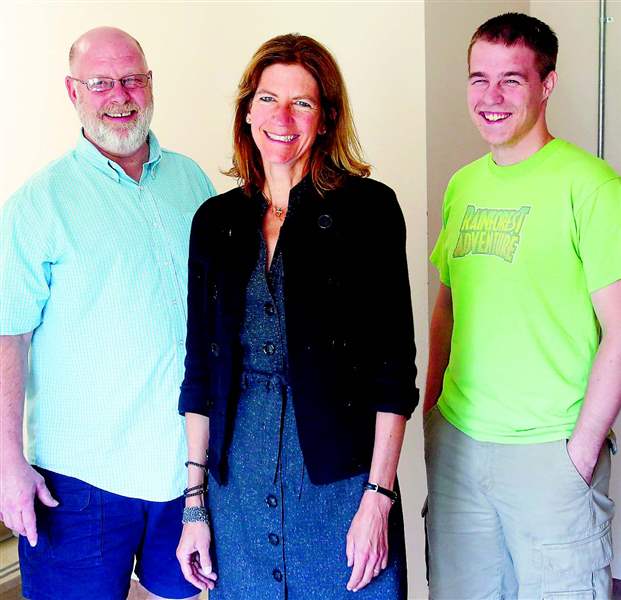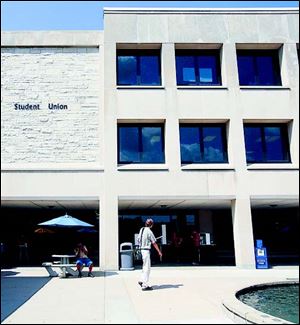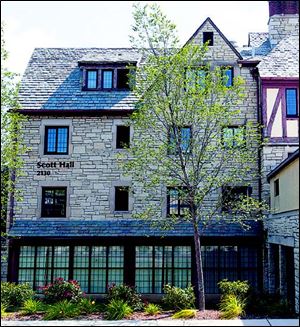
Campus, spiritual life walk a fine line at many public universities
8/24/2013
The Rev. David Montgomery, director of Toledo Campus Ministry, Professor Jeanine Diller, director for the Center for Religious Understanding, and Doug Walton of H2O Church.
The Blade/Katie Rausch
Buy This Image

The Rev. David Montgomery, director of Toledo Campus Ministry, Professor Jeanine Diller, director for the Center for Religious Understanding, and Doug Walton of H2O Church.
Religion on the campus of a public university has challenges. The first amendment says that Congress cannot establish religion, but that amendment also guarantees the free exercise of religion. “Those things are in tension with each other,” said Jeanine Diller, director of the Center for Religious Understanding at the University of Toledo and a professor of philosophy and religion. “The Center promotes understanding of religion but does not promote religion.”

The Ark, home of Toledo Campus Ministry.
School is back in session and so are the university's religion-related programs and religious student organizations. The Center offers a “mix of lectures, forums, and service,” Ms. Diller said, along with plans for adding to its library of Faith Matters TV interviews available atwgte.org/faithmatters, and “we continue to work with other organizations to support what they're doing in the community.”
h2o Church recently started at the university; the original h2o is in Bowling Green and h2o is at other Ohio colleges and out of state. The h2o churches have connections to Great Commission Ministries and the Collegiate Church Network. H2o Toledo's pastors are Matt Olszewski and Matt Pardi.
Toledo Campus Ministry, at 2086 Brookdale Rd., is supported by nine religious organizations, including the United Methodists, the Presbyterian Church (U.S.A.), local churches, “and a lot of individuals,” the Rev. David Montgomery, TCM's director, said. It also rents space to the YMCA, and Buddhists and the Holy Spirit Catholic Community (not part of the Roman Catholic Diocese of Toledo) hold observances there.
“Toledo Campus Ministry, which is off campus and is privately funded, can promote religion if it wants to, and it can have an interfaith prayer service, for example, if it wants to,” Ms. Diller said. “But the Center for Religious Understanding, which is an arm of the university, cannot do those things. So I watch that like a hawk to make sure that our business is all about promoting understanding.”
Mr. Montgomery, a Presbyterian minister, said that TCM is “as close to being on campus and not be on,” with its three buildings--the Interfaith Chapel, the Ark, and the Interfaith Center--at the campus border. It is an official student organization which has been at the university for more than 45 years..

The Student Union on the UT campus.
h2o doesn't want to be “just another college ministry,” said Doug Walton, a missionary connected with h2o Church as a field staff member. “We want to be something that is not so common, and that is a college church. The only thing not church is that we don't have a building," and as a student organization it uses on-campus places.
TCM wants “to help be a bridge for local congregations to be on campus," Mr. Montgomery said.
College students have many religious options. At the university, Mr. Montgomery said, “Of the 23 religious student organizations, I think we would be the most progressive. But we also seek deeply in the traditions of our denominations.” TCM is “intentionally diverse racially, nationally. We have Africans. We have South Americans. We have gays and straights and bisexuals, and that's intentional.” Mr. Montgomery said that TCM is “an inclusive community, so that's the difference that I think Doug [Walton] and I are going to have. I'm assuming that that's going to be real different” from h2o's congregation.
In one way, it won't be so different. Mr. Walton's mission with h2o “is first and foremost international students,” he said. “It's my big obsession.” So there could be little difference in the two religious organizations' racial and national diversity. But culturally, h2o would be much more conservative. Though “officially nondenominational,” Mr. Walton said, h2o churches are all members of the Southern Baptist Convention, and “we would agree with the SBC on pretty much everything except alcohol, which is just totally unbiblical—like, why do you have to prohibit alcohol? Jesus drank it.” Mr. Walton said that h2o and TCM “probably play for the same team [as Christians], but even if we don't, we're still friends.”
Many students don't play for the Christian team, or a team of any other faith. “We try in our advertising to use words like 'perspectives on religion' versus 'religious perspectives' in order to make room for nonreligious perspectives on religion,” Ms. Diller said. She found that about 20 percent of University of Toledo students are in the 'unaffiliated' category, which includes atheists.
Mr. Walton sees the unaffiliated as potential friends and perhaps converts. “We want to put people who are following Christ into relationships with people who are not following Christ and let God do his magic, because it is pretty magical,” he said.

Scott Hall at the University of Toledo.
The nonbelievers are “a harder group to approach,” Mr. Montgomery said. “We make no apologies about being nonapologetic; I'm not going to teach them the answers. I hope we can raise the questions together.”
“The religious traditions are so incredibly rich, and the nonreligious responses to those traditions are so incredibly rich, and all very powerful,” Ms. Diller said. “And there's so much to learn.”
The Center for Religious Understanding will take part in the university's Interfaith Week Oct. 20-26, and will offer a religious diversity workshop to the public on Oct. 25 from 1 p.m. to 4:30 p.m.
Also in the fall semester, the Center cosponsors the Catholic-Muslim Dialogue, “Salvation: Catholic and Muslim Perspectives,” Sept. 19 at 6:30 p.m., and it presents the Murray/Bacik Lecture in Catholic Studies on Nov. 13 at 7 p.m., with Professor Peter Feldmeier speaking on “Pope Francis and the Future of Catholicism.”
The Center's Interfaith Forums take place throughout the year, and the Center will also continue its Multifaith Service Learning Project at Chase K-8 School.
h2o Church offers Sunday Services at 11:30 a.m. in Student Union room 2582, “Life Groups” Mondays and Thursdays at 8 p.m. in Student Union Room 3020, and other opportunities for socializing and prayer.
Toledo Campus Ministry has “Soul Food” on Wednesdays at 7 p.m., with church-member-prepared meals and fellowship. On Sundays at 4 p.m., Mr. Montgomery will host a study of Brian McLaren's book Naked Spirituality. Service trips to New Jersey and to Haiti are planned.
And, Mr. Montgomery said, on Oct. 5 “we are having a pretty large emphasis on homecoming this year to honor Dee Baker,” the previous TCM director, with a mission fund.
Actual school is in session, too. Ms. Diller is teaching two courses, World Religions and “Deism, Atheism, and Ultimism. It's based on research I'm doing right now that I'm going to be presenting at Oxford University in less than a month at the British Society for Philosophy and Religion,” she said.
Contact TK Barger @ tkbarger@theblade.com, 419-724-6278 or on Twitter @TK_Barger.